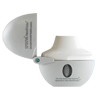Tiotropium General Information

Tiotropium is used to control and prevent symptoms (such as wheezing, shortness of breath) caused by ongoing lung disease (chronic obstructive pulmonary disease-COPD, which includes bronchitis and emphysema). It works by relaxing the muscles around the airways so that they open up and you can breathe more easily. Tiotropium belongs to a class of drugs known as anticholinergics. Controlling symptoms of breathing problems can decrease time lost from work or school.
Tiotropium must be used regularly to be effective. It does not work immediately and should not be used to relieve sudden breathing problems. If wheezing or sudden shortness of breath occurs, use your quick-relief inhaler (such as albuterol, also called salbutamol in some countries) as prescribed.
How to Use Tiotropium
Read the Patient Instruction Sheet for directions on the proper use of Tiotropium. If you have any questions, consult your doctor or pharmacist.
Follow the instructions for test sprays in the air if you are using the inhaler for the first time or if you have not used it for more than 3 days or for more than 21 days. Make sure to spray away from the face so that you do not get the medication into your eyes. A slow-moving mist is a sign that the inhaler is working properly.
Inhale Tiotropium by mouth as directed by your doctor, usually 2 sprays once daily. Do not inhale more than 2 sprays in 24 hours.
Avoid getting Tiotropium into your eyes. It may cause eye pain/irritation, temporary blurred vision, and other vision changes. Therefore, when using the inhaler, put your lips tightly around the mouthpiece.
Rinse your mouth after using the inhaler to prevent dry mouth and throat irritation.
If you are using other inhalers at the same time, wait at least 1 minute between the use of each medication.
Use Tiotropium regularly to get the most benefit from it. To help you remember, use it at the same time each day.
Do not increase your dose or use Tiotropium more often or for longer than prescribed. Your condition will not improve any faster, and your risk of side effects will increase.
Clean the mouthpiece of the inhaler at least once a week as directed.
Learn which of your inhalers you should use every day and which you should use if your breathing suddenly worsens (quick-relief drugs). Ask your doctor ahead of time what you should do if you have new or worsening cough or shortness of breath, wheezing, increased sputum, waking up at night with trouble breathing, if you use your quick-relief inhaler more often, or if your quick-relief inhaler does not seem to be working well. Learn when you can treat sudden breathing problems by yourself and when you must get medical help right away.
Tiotropium Possible Side Effects
Dry mouth and dizziness may occur. If either of these effects persists or worsens, tell your doctor or pharmacist promptly.
Remember that your doctor has prescribed Tiotropium because he or she has judged that the benefit to you is greater than the risk of side effects. Many people using Tiotropium do not have serious side effects.
Tell your doctor right away if you have any serious side effects, including: difficulty urinating, painful urination.
Infrequently, Tiotropium may cause severe sudden worsening of breathing problems right after use. If you have sudden worsening of breathing, use your quick-relief inhaler and get medical help right away.
Get medical help right away if you have any very serious side effects, including: eye pain/swelling/redness, vision changes (such as seeing rainbows around lights at night, blurred vision).
A very serious allergic reaction to Tiotropium is rare. However, get medical help right away if you notice any symptoms of a serious allergic reaction, including: rash, itching/swelling (especially of the face/tongue/throat), severe dizziness, trouble breathing.
Tiotropium Precautions
Before using tiotropium, tell your doctor or pharmacist if you are allergic to it; or to ipratropium; or to atropine; or if you have any other allergies. Tiotropium may contain inactive ingredients, which can cause allergic reactions or other problems. Talk to your pharmacist for more details.
Before using Tiotropium, tell your doctor or pharmacist your medical history, especially of: personal or family history of glaucoma (angle-closure type), difficulty urinating, enlarged prostate, kidney disease.
Tiotropium may make you dizzy or cause blurred vision. Do not drive, use machinery, or do any activity that requires alertness or clear vision until you are sure you can perform such activities safely. Limit alcoholic beverages.
Before having surgery, tell your doctor or dentist about all the products you use (including prescription drugs, nonprescription drugs, and herbal products).
Older men may be at greater risk for difficulty urinating while using Tiotropium.
During pregnancy, Tiotropium should be used only when clearly needed. Discuss the risks and benefits with your doctor.
It is unknown if Tiotropium passes into breast milk. Consult your doctor before breast-feeding.
Tiotropium Possible Intercations
Drug interactions may change how your medications work or increase your risk for serious side effects. This document does not contain all possible drug interactions. Keep a list of all the products you use (including prescription/nonprescription drugs and herbal products) and share it with your doctor and pharmacist. Do not start, stop, or change the dosage of any medicines without your doctor's approval.
Some products that may interact with Tiotropium include: other anticholinergics (such as ipratropium, atropine).